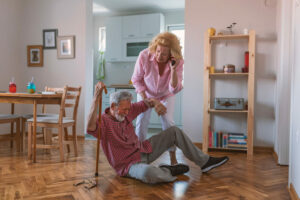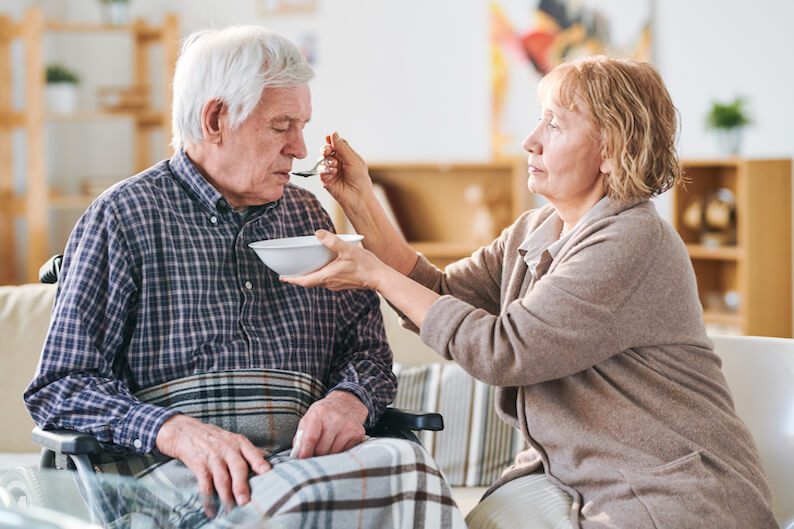Knowledge Is Power
The level of care will depend on the severity and extent of damage from the stroke. In the first few weeks after the stroke, there will be a lot you have to learn and figure out as you assess the future. Don’t be afraid to ask questions. While your loved one is still in the hospital, ask the doctor any questions you may have about what to expect once you get home. Discuss medications, diet, and rehabilitation.
Hospitals or managed care facilities may have support groups or programs you can join. Talk with the health care team, case managers, or occupational therapist if you have questions regarding the stroke recovery process. The more you know, the better you will be able to care for your loved one or a stroke patient at home.
Adapt Your Home
Before leaving the hospital, you need to evaluate your home for safety. A social worker can help determine what modifications need to be made to accommodate your loved one and their specific needs following the stroke. For example, a walker, ramps, or grab bars may need to be installed for assistance.
If your loved one is in a wheelchair, special door hinges can be used to provide room for a wheelchair to pass through. There are also risers that can raise the bed, making it easier to get in and out.
You want to do whatever you can to prevent falls. Up to 76 percent of stroke patients experience falls in the first six months after returning home. Consider placing non-slip mats around the home to improve your loved one’s safety. Make sure loose items are picked up and not in a walking path. If your loved one falls, don’t ignore it. Notify their physician and physical therapist. It may be an indication something else is going on.

Reduce Risk Factors for Second Stroke
Stroke survivors have a greater risk of having another stroke. To minimize this risk, make sure you take the necessary precautions and follow all post-stroke recommendations and orders. In addition:
- Prepare healthy and well-balanced meals so your loved one gets the proper vitamins and nutrients to keep their blood pressure and cholesterol in check.
- Monitor medications and be sure all prescriptions are taken as prescribed.
- Ensure all doctor appointments are being attended and the stroke patient is regularly monitored by their physician.
Encourage Daily Exercise
Obviously, we aren’t talking about intense exercise, but even helping to facilitate daily movement and rehabilitation can push a stroke patient further along their road to recovery. It’s common for stroke patients to struggle with motor impairment after a stroke. So, they must build back memory muscles and strengthen their fine motor skills with daily exercise and movement. Something as simple as walking can help to rewire their brain and build strength. Let them try to do as much as they can on their own. Be helpful but not overbearing.
Keep An Eye Out For Side Effects
The goal is for the stroke survivor to continuously improve after leaving the hospital; however, new stroke side effects can become evident even several months following the stroke. Watch out for any type of medication side effects as well as mobility and emotional changes. If you do notice anything unusual or different about your loved one, contact their doctor as soon as possible to discuss.
Focus On The Positives And Be Supportive
A lot of emotions surface after a stroke. Sudden outbursts are common as patients struggle with their inability to do specific tasks and activities. Even though it may be frustrating and hard at times on the caregiver, try to be as patient and understanding as you can.
Be on the lookout for signs of anxiety and depression. Thirty to 50 percent of stroke survivors experience depression in the early or later phases of post-stroke. Post-stroke depression can severely hinder recovery. Symptoms of depression can include persistent sadness, irritability, loss of interest in things that once provided pleasure, insomnia, weight changes, and suicidal thoughts. If you notice any changes in behavior, consult a specialist for help.
Take Care of Yourself
Just as post-stroke recovery is difficult for the patient, it’s also difficult for the caregiver. While caring for a stroke patient at home, don’t forget to take care of yourself. Don’t be afraid to ask for help. It’s common for caregivers to take on too much, leading to burnout. You need time to recharge, so you’re able to provide the best care possible to your loved one.
Caring for someone after a stroke can be a challenging experience. The number one thing to remember when being a caregiver is that you aren’t alone. There’s a support team surrounding you that wants to help. Use your resources and get help when needed. And remember, you can do this!



